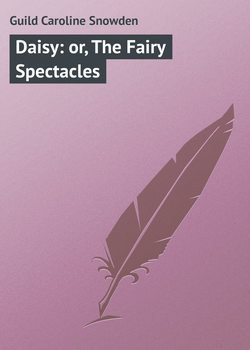Читать книгу Daisy: or, The Fairy Spectacles - Guild Caroline Snowden - Страница 4
CHAPTER IV.
GREAT PICTURE BOOKS
ОглавлениеYou would not suppose that Susan's home could be any different because such a poor little thing as Daisy had come into it; but bright and pleasant as it was before, it was a hundred times brighter and pleasanter now.
The child was so gentle and loving, and so happy and full of life, that Susan and Peter felt almost like children themselves, in watching her. No matter how tired Peter was at night, he would frolic an hour with Daisy, tossing the little thing in the air, lifting her up among the boughs till she was hidden from sight. And Susan would leave her work any time to admire Daisy's garden, or to dress the wooden doll that Peter had made for her.
As for Daisy's self, she was the busiest little soul alive, after she once learned to walk; for at first she could only lie and look up at the leaves, and the great sky, so far, far off, and see the slow, white clouds sail past the tops of the trees, and watch the birds, that hopped from branch to branch and looked down at her curiously, wondering if she were any thing good to eat.
Daisy would hold up her little hands, to tell them they'd better not try, and then the bird would turn it off by singing away as if he had no such thought, and watch her as he warbled his gay little song, that said, "O Daisy, I'm having a beautiful time; are you?"
Then Daisy would coo, and laugh, and clap her hands, which was her song, and which meant, "Yes, indeed; only wait till I can use my feet, and have a run with you."
Peter made a rough kind of cradle out of willow twigs, and hung it in a tree, so that the fresh, green leaves shaded it, and kept away the flies, and fanned Daisy's face, as she lay there swinging, when the day was warm, like a little hangbird in her nest.
No wonder the child was always fond of birds, when she began so early to live with them and listen to their songs.
But Daisy learned to walk in time; and then she was constantly flying about, like the butterflies she loved. For the little girl thought even more of butterflies than of birds; they seemed to her like beautiful flowers sailing through the air, and making calls upon the other flowers, that were fastened down to the earth, – poor things! – as she used to be before she learned to walk.
She would pick the flowers sometimes, and toss them into the air to see if they didn't fly, and tell them they were silly things to fall back on the ground and wilt, when, if they only would not be afraid, they might float off, with all their wings, and see a little of the world.
Daisy's hands were always full of flowers; and she brought some to the cabin which Susan had never seen before; for the good woman could not leave her work long enough to go in such out-of-the-way places as they chose to blossom in.
Daisy had no work except to amuse herself; and she never tired of trudging under the trees, crowding her way among the tall weeds by the river bank, and creeping behind great rocks, or into soft, mossy places in the heart of the quiet wood; and here she was sure of finding strange and lovely things.
These were the little girl's books; she had no spelling and history like yours, but studied the shapes of leaves and clouds, and the sunshine, and river, and birds.
She did not know all their names, but could tell you where the swallow lived, and where wild honeysuckles grew, and the humming bird hid her little eggs, and how many nuts the squirrel was hoarding for winter time, and how nicely the ant had cleaned her house for spring, and when the winged seeds on the maple tree would change to broad green leaves, and the leaves themselves would change to colors as gay as the sunset, and then all droop and wither, and leave the bright little stars to wink at her through the naked boughs.
The birds all knew Daisy, and were not afraid of her; they would bring their young ones about the door, that she might feed them with crumbs and seeds. And even the sly little rabbits, that started if a leaf fell, came quietly and nibbled grass from Daisy's hands, and let her stroke their long, soft ears.
You may wonder that Susan was not afraid the snakes and wolves would devour her little girl; but, as I told you before, she never could help thinking that the old woman was somewhere in the wood, and remembering how she had smiled at looking into the baby's face, thought she would not let Daisy come to any harm.
And she was right; for the fairy only lifted her finger when the little girl passed, and the wolf that had begun to watch and growl at her would crouch back in his den, and fall asleep.
But he would not have frightened Daisy, had he come forth; she did not know the name of fear, and, glad to see a new play-fellow, would perhaps have climbed on his back, and, patting his mouth so gently with her little hand that he forgot to growl, would have told him now he might gallop along, and take her home to her mother.
